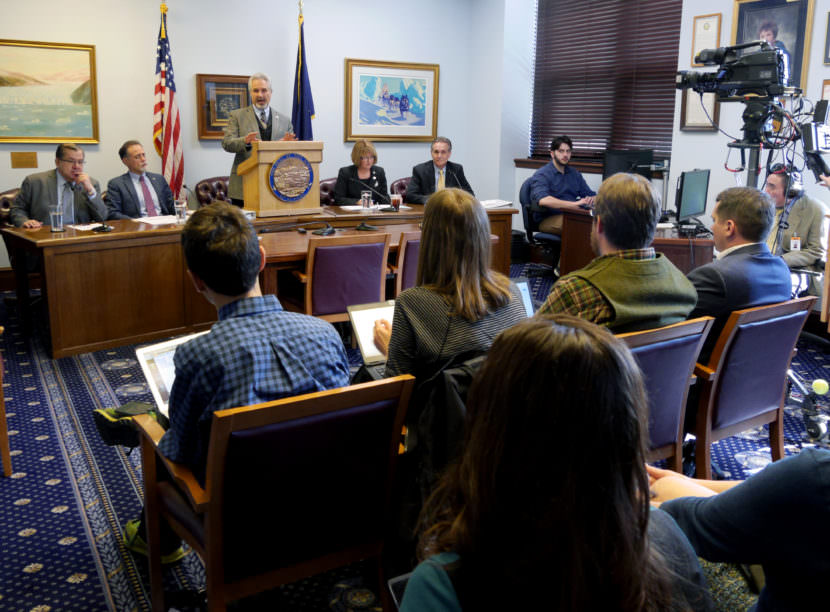
The news about oil revenue comes out two days before the Legislature was scheduled to end its session. But with much work left to do, lawmakers will continue to work in Juneau next week. To talk about this, Alaska Public Media’s Lori Townsend spoke with Alaska Public Media and KTOO’s Andrew Kitchenman.
Lori: So, the two big tasks for the Legislature are agreeing on a state budget for next year and agreeing on a plan to make budgets stable in the future. How does the oil revenue news play into that?
Andrew: It depends on which side of the partisan divide in the legislature you’re talking to. Republican members of the Senate majority and House minority, they say the new revenue is gonna weaken the case for introducing a state income tax. They don’t want it. But on the House side in the majority members, they say this new money is not gonna close the gap. It’s just not enough to close the budget gap and so they are sticking with their plans for an income tax.
Lori: And we should stay that the majority in the house in the House is mostly Democrats.
Andrew: That’s true. So there’s definitely a divide there. But there are three members of the House majority who are Republicans and two Independents.
Lori: Where do things stand on the budget?
Andrew: The Senate has to decide whether they’re going to accept the House’s version of the budget. That’s probably not going to happen – the two chambers are $230 million apart. So, what will happen is the leader of each chamber chooses three members to meet in the conference committee and they’ll have to work out their differences over the budget. The Senate wants to spend $230 million less than the House. So that’s really where the division is.
Lori: What about a long-term plan to balance the budget?
Andrew: Just like the difference on the budget for next year, the two chambers haven’t reached an agreement. The Senate is primarily focused on drawing money from Permanent Fund earnings to pay for state government. Their plan also includes setting Permanent Fund dividends at $1,000, and it counts on making a lot of budget cuts, $750 million over three years. The House added a provision to the Permanent Fund bill the Senate passed and that says the bill will only go into effect if the Legislature also passes bills to reintroduce an income tax and raise oil and gas taxes. They also want PFDs to be $1,250.
Lori: What do senators think of the House plan?
Andrew: Some senators in the majority caucus say the House should have sent over what they call “a clean bill” – a bill that only had the changes to the Permanent Fund. Didn’t have the income tax. The chairmen of the House Finance Committee originally wanted to pass a different bill that combined changes to the Permanent Fund with an income tax. But they decided to not to do that.
Lori: Why is that?
Andrew: They were concerned there would be a lawsuit challenging whether the bill violates the provision of the state Constitution that says laws must be confined to a single subject. Members of the House minority say they have a similar concern with the change that the majority made to the Permanent Fund bill. They think that making the Permanent Fund changes dependant on the tax bills also violates the rule about having a single subject.
Lori: Do we know what the courts are likely to say about that?
Andrew: We actually do have an idea. Doug Gardner, who’s the Legislature’s top lawyer for the nonpartisan legislative affairs agency, he wrote a memo that I obtained. And Gardner writes in the memo that the House majority’s law would likely survive legal challenge. He looks at precedents in other states about whether it’s legal to make one law depend on passing other laws. And he also looks at whether it violates the rule about having a single subject. Gardner found that courts usually find it’s OK to say that one bill depends on other bills passing, but that’s true basically as long as each separate bill is on a single subject.
Lori: Do we know when the session is likely going to end?
Andrew: Not we don’t. There could be dozens of bills that the Legislature works on within the next month. The Senate majority laid out about 17 and the House has others. And if the Legislature doesn’t finish its work by May 17th – which is the day the Constitution says the session must end – then there could be a special session after that.
Andrew Kitchenman is the state government and politics reporter for Alaska Public Media and KTOO in Juneau. Reach him at akitchenman@alaskapublic.org.




